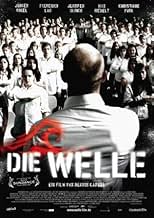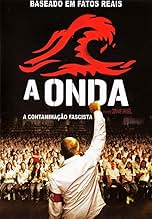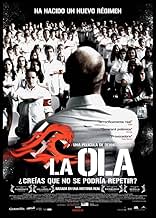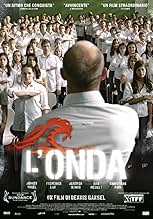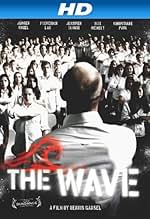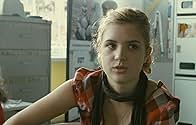IMDb RATING
7.6/10
119K
YOUR RATING
A high school teacher's experiment to demonstrate to his students what life is like under a dictatorship spins horribly out of control when he forms a social unit with a life of its own.A high school teacher's experiment to demonstrate to his students what life is like under a dictatorship spins horribly out of control when he forms a social unit with a life of its own.A high school teacher's experiment to demonstrate to his students what life is like under a dictatorship spins horribly out of control when he forms a social unit with a life of its own.
- Awards
- 9 wins & 8 nominations total
Featured reviews
An amiable German social sciences teacher has to teach his children about an autocratic government. The children at first seem bored, not wanting to hear any more about The Third Reich and Nazism. The teacher is surprised. "We're too knowledgeable to ever fall into something like that again," say the students. The teacher then decides to show the children what it's like to live in an autocracy, and sets up a simple experiment in class. They elect a leader (him) and he begins to instill in them (merely as an example) the virtues and practices that accompany an autocracy ("Strength through discipline", "Work as one"). The students take to it, and become obsessed with it. Soon, what was a simple classroom experiment grows to a social entity all it's own, with the teacher not sure if he can reverse the effects.
The film was very well acted and written, and was seriously creepy. It showed how - easily a society could fall into fascism, if presented to the society in the correct way. Watching the film, I understood why the students enjoyed the new system, but was also privy to the horrors that come with it. A shocking and powerful film. The way the different children reacted and how such a seemingly innocent experiment profoundly affected their lives was incredible and horrifying. Vogel gives a powerful performance as an idealistic teacher who isn't aware of the influence he has on others. Worth seeing.
The film was very well acted and written, and was seriously creepy. It showed how - easily a society could fall into fascism, if presented to the society in the correct way. Watching the film, I understood why the students enjoyed the new system, but was also privy to the horrors that come with it. A shocking and powerful film. The way the different children reacted and how such a seemingly innocent experiment profoundly affected their lives was incredible and horrifying. Vogel gives a powerful performance as an idealistic teacher who isn't aware of the influence he has on others. Worth seeing.
This is a German film (subtitled) about a school project looking at autocracy (a la Nazi Germany). In order for the teacher to persuade his pupils that autocracy remains a real threat to democracy, he persuades them to take part in a class dictatorship. The key difference between this and your average school classroom is that he convinces the pupils not just to obey but also to want his every command. Of course the project turns bad and things get scary.
What I liked about the film was that it did not treat the pupils as "just kids"; they had brains, opinions, and their own ethics too. It is not a very black and white in it's opinion, you could draw some distinct opinion from the film but I suggest that there are several different opinions that are equally as valid. It keeps you guessing what is going to happen & even deliberately misleads you.
What I liked about the film was that it did not treat the pupils as "just kids"; they had brains, opinions, and their own ethics too. It is not a very black and white in it's opinion, you could draw some distinct opinion from the film but I suggest that there are several different opinions that are equally as valid. It keeps you guessing what is going to happen & even deliberately misleads you.
"Die Welle" is an above average classroom drama with a political voice. Helmed by director Dennis Gansel, film is unforgiving in depicting the youth as a generation without anything to rebel about but loneliness, making them sensitive to any sort of illusion of belonging. Mostly a riveting affair, film lags in its second act as it jumps into Dawson's Creek. Film goes ashore into a memorable finale. Straight forward filming will captivate audiences, along with a pleasing cast.
Project week in a suburban high school entails them to study various forms of government and restriction. Rainer Wenger (Jürgen Vogel), an under-appreciated teacher finds a way in engaging his students. He cleverly manipulates his class to slap them out of apathy and disinterest with tiny minute changes which eventually builds up to a boil. Classroom scenes are stimulating as debates between the students are daring and engrossing writing mention controversial topics that are usually not spoken with lethargy. Film focuses on a group of smart people, highlighting further that what's bound to happen is even more tragic and rings a bell to what can happen out of celluloid..
Inspired by a 1960's social experiment in California documenting how easy it is to influence individuals, film looses track in its middle section as it begins to refocus on the individual lives of the students. Most characters seem to be run in the mill with general high school romance trouble, which would have been interesting but brings nothing new to the table. Stories work better as a collective rather than individuals, which further add to the intended effect. Some personalities shine though: students who never had any sense of belonging are indeed looked at with much heartbreak here as this false sense of security is embraced by them, motivating them to go a step further in preserving the society.
Finale is spellbinding as even if it diverts a lot from the actual experiment, it still proves as a necessity to further establish a point. Film parallels to the effect of Third Reich within its members and climax reminds audiences of the Bruno Ganz header "Der Untergang", as it clearly parallels the extent of loyalties that may arise in such occasions. From the get go, death of a character is imminent and even with its shock value, it justifies itself as beyond a plot device.
As an ensemble, the acting here is impermeable as they all deliver solid performances. Vogel especially convey solid work as the teacher. He brings gravity and his semi-bald haircut proves ominous. It's a shame that audiences lose connection to him midway though as he suddenly becomes the background to the melodrama.
German setting of the movie elevates the film's status. It creates this palpable undercurrent, that even with a country that already identifies itself as guilty; it still cannot escape the possibility of anarchy. Even if the picture becomes stern with its themes, it still is digestible to the mainstream. Word of mouth can secure a life outside the tills.
Project week in a suburban high school entails them to study various forms of government and restriction. Rainer Wenger (Jürgen Vogel), an under-appreciated teacher finds a way in engaging his students. He cleverly manipulates his class to slap them out of apathy and disinterest with tiny minute changes which eventually builds up to a boil. Classroom scenes are stimulating as debates between the students are daring and engrossing writing mention controversial topics that are usually not spoken with lethargy. Film focuses on a group of smart people, highlighting further that what's bound to happen is even more tragic and rings a bell to what can happen out of celluloid..
Inspired by a 1960's social experiment in California documenting how easy it is to influence individuals, film looses track in its middle section as it begins to refocus on the individual lives of the students. Most characters seem to be run in the mill with general high school romance trouble, which would have been interesting but brings nothing new to the table. Stories work better as a collective rather than individuals, which further add to the intended effect. Some personalities shine though: students who never had any sense of belonging are indeed looked at with much heartbreak here as this false sense of security is embraced by them, motivating them to go a step further in preserving the society.
Finale is spellbinding as even if it diverts a lot from the actual experiment, it still proves as a necessity to further establish a point. Film parallels to the effect of Third Reich within its members and climax reminds audiences of the Bruno Ganz header "Der Untergang", as it clearly parallels the extent of loyalties that may arise in such occasions. From the get go, death of a character is imminent and even with its shock value, it justifies itself as beyond a plot device.
As an ensemble, the acting here is impermeable as they all deliver solid performances. Vogel especially convey solid work as the teacher. He brings gravity and his semi-bald haircut proves ominous. It's a shame that audiences lose connection to him midway though as he suddenly becomes the background to the melodrama.
German setting of the movie elevates the film's status. It creates this palpable undercurrent, that even with a country that already identifies itself as guilty; it still cannot escape the possibility of anarchy. Even if the picture becomes stern with its themes, it still is digestible to the mainstream. Word of mouth can secure a life outside the tills.
This is my fourth German film and I'm digging them. Because you asked, I watched "Das Boot," "Downfall," and "Run Lola Run."
I thought "The Wave" was going to be corny. I thought it was going to be about a group of simple-minded kids following a leader because of some bromides. It wasn't that at all.
Rainer Wenger (Jurgen Vogel) was a teacher who was teaching a class on autocracy for project week. After a spit-fire discussion with the class about what autocracy is Mr. Wenger decided to do an experiment with the class. For project week only they would have to do what Mr. Wenger said. There were a few that resisted and left the class, but those who remained were all in. Slowly, we saw the evolution of a movement.
"The Wave" is the negative side of populism. I say that because the Wave, meaning the organization they formed, could easily have been something good. Mr. Wenger had his students doing very constructive and positive stuff. Who doesn't believe that there's strength in unity, who doesn't believe in equality, who doesn't believe in helping their fellow man? Plenty of organizations, religions, and movements purport similar beliefs and they are viewed as being good. It's when people use these goodly aims to form radical armies bent on purging, "cleansing," or otherwise harming those who don't think like them, that makes a movement into a gang. And if the movement is large enough to engulf an entire nation it becomes an autocracy.
"The Wave" gives food for thought. I think the larger lesson wasn't about being a part of something, I think it was about extremism. That very same group with more moderate participants could easily have been an asset to their school and their community. So I don't knock the Wave for its extremists anymore than I knock a religion for its extremists. Don't throw the baby out with the bath water.
I thought "The Wave" was going to be corny. I thought it was going to be about a group of simple-minded kids following a leader because of some bromides. It wasn't that at all.
Rainer Wenger (Jurgen Vogel) was a teacher who was teaching a class on autocracy for project week. After a spit-fire discussion with the class about what autocracy is Mr. Wenger decided to do an experiment with the class. For project week only they would have to do what Mr. Wenger said. There were a few that resisted and left the class, but those who remained were all in. Slowly, we saw the evolution of a movement.
"The Wave" is the negative side of populism. I say that because the Wave, meaning the organization they formed, could easily have been something good. Mr. Wenger had his students doing very constructive and positive stuff. Who doesn't believe that there's strength in unity, who doesn't believe in equality, who doesn't believe in helping their fellow man? Plenty of organizations, religions, and movements purport similar beliefs and they are viewed as being good. It's when people use these goodly aims to form radical armies bent on purging, "cleansing," or otherwise harming those who don't think like them, that makes a movement into a gang. And if the movement is large enough to engulf an entire nation it becomes an autocracy.
"The Wave" gives food for thought. I think the larger lesson wasn't about being a part of something, I think it was about extremism. That very same group with more moderate participants could easily have been an asset to their school and their community. So I don't knock the Wave for its extremists anymore than I knock a religion for its extremists. Don't throw the baby out with the bath water.
That's what the title "Die Welle" means. A teacher makes an experiment. He wants his class to understand what autocracy means. It starts with them stopping calling him by first name. Then they have to rise while addressed. Then, there are uniforms and a special saluting. And then, it runs out of control.
The most disturbing thing is that the teacher slowly loses control over himself, until there is a disaster.
OK, does it take a week to form young people to fascists? That's not the point. How ever long it takes, the interesting answer here is that it is possible at all. Do we run that risk too? Well, if you look into yourself, you maybe won't find a fascist, but you'll probably find someone who wants to be a part of something. Whatever it is.
The most disturbing thing is that the teacher slowly loses control over himself, until there is a disaster.
OK, does it take a week to form young people to fascists? That's not the point. How ever long it takes, the interesting answer here is that it is possible at all. Do we run that risk too? Well, if you look into yourself, you maybe won't find a fascist, but you'll probably find someone who wants to be a part of something. Whatever it is.
Did you know
- TriviaBased on the novel "The Wave" by Todd Strasser (under the pen name Morton Rhue), a fictionalized account of the "Third Wave" teaching experiment by Ron Jones that took place in a Cubberley High School history class in Palo Alto, California in April 1967.
- GoofsAlthough set somewhere in western Germany, all policemen wear insignia of the state of Berlin.
- Quotes
Rainer Wenger: So you don't think there could be another dictatorship in Germany?
Jens: No, we are too enlightened now.
- Crazy creditsOpening and closing credits appear as graffiti.
- ConnectionsFeatured in Die Johannes B. Kerner Show: Episode dated 12 March 2008 (2008)
- SoundtracksRock 'n' Roll High School
Written by Joey Ramone, Johnny Ramone and Dee Dee Ramone
Performed by EL*KE
Produced by Mirko Schaffer
©1980 WB Music Corp. and Taco Tunes
- How long is The Wave?Powered by Alexa
Details
Box office
- Budget
- €5,000,000 (estimated)
- Gross worldwide
- $32,350,637
- Runtime
- 1h 47m(107 min)
- Color
- Sound mix
- Aspect ratio
- 2.35 : 1
Contribute to this page
Suggest an edit or add missing content





